|
 Professor
Julian Bond Professor
Julian Bond
Civil Rights Activist, Chairman, NAACP
Founding member of SNCC
Click here to watch additional interview
material with Professor Julian Bond
Julian Bond has served as the Chairman of the National Association
for the Advancement of Colored People, the nation's oldest
and largest civil rights organization, since 1998. He graduated
from the George School, a coeducational Quaker school in Bucks
County, Pennsylvania, in 1957, and entered Morehouse College
in Atlanta that same year. While still a student, Bond was
a founder of the Committee on Appeal for Human Rights (COAHR),
a student civil rights organization that helped win integration
of Atlanta's movie theaters, lunch counters, and parks. Bond
was also one of several hundred students from across the South
who helped to form the Student Nonviolent Coordinating Committee
(SNCC).
Bond was first elected in 1965 to a one year term in
the Georgia House of Representatives. Members of the House
voted not to seat him because of his outspoken opposition to
the war in Vietnam. Bond was elected two more times before
the Supreme Court ruled unanimously that the Georgia House
had violated Bond's rights in refusing him his seat.
He was elected to the
Georgia Senate in 1974. When he left the state senate in January
1987, Bond had been elected to public office more times than
any other black Georgian, living or dead, ending his tenure
only when an unsuccessful congressional race in 1986 prevented
him from seeking re-election to the Senate. Bond was nominated
for Vice President of the United States, the first black person
to be so nominated by a major political party, though he withdrew
his name because he was too young to serve.
Bond holds numerous honorary degrees and
has served on the boards of many organizations working for
social change. He is currently a Distinguished Scholar in Residence
at the American University in Washington, D.C., and a professor
in the history department at the University of Virginia.
In 1995, Bond was
elected to his fourth term on the National Board of the National
Association for the Advancement of Bond has served as chairman
of the NAACP since his election in February 1998.
A collection of Bond's essays has been published under
the title A Time To Speak, A Time To Act. His poems and articles
have appeared in The New York Times, American Negro Poetry,
the Los Angeles Times, and several other national publications.
Bond has narrated many other acclaimed films including, the
Academy Award-winning "A Time for Justice" and "The
Shadow of Hate," which was nominated for an Oscar.
|
 Gloria Bradley Gloria Bradley
Attended March on Washington at age 14
Click here to watch additional interview
material with Gloria Bradley
Gloria Bradley was born in Harlem Hospital in New York November 28, 1948. Her
family moved to the South Bronx when she was 5 years old. She was a brownie,
a girl scout, and as a member of The Soundview Presbyterian Church, she participated
in a number of youth activities.
The church and it's congregation was very supportive of the Civil Rights movement.
When the call was made for the nation to come to Washington D.C. in order to
march for equality and justice for all, Soundview Presbyterian responded with
an all out campaign to mobilize the participation of the residents of the South
Bronx. In the end Soundview Presbyterian sponsored four bus loads of marchers,
including a 14 year old Gloria Bradley. They joined in with hundreds of other
buses and car loads of people from the north who went to Washington D.C. on August
28th 1963 in order to be a part of the March on Washington.
Bradley remembers that day fondly.
"I was 14 years old, at the time, and I knew about the segregation laws
because of the summers that me and my sisters spent with my grandparents In Danville,
Virginia. In his book Dr. King talked about Danville. He described it as one
of the most hate-filled cities that he had ever been in, and it was. Danville
has changed a lot since the March on Washington. Gone are the "for whites
only" signs and other accoutrements of segregation in Danville. Dr. king's
dream of integration has been realized in Danville. "
|
 Dr. Terrance Roberts Dr. Terrance Roberts
Little Rock Nine
Click here to watch additional interview
material with Dr. Terrance Roberts
Terrence Roberts was a 15 year old eleventh grader when he joined
eight other students and became one of the first nine black students
to go to Central High School, a formerly segregated public high
school in Little Rock, Arkansas. He is now co-chairperson of
the Master's in Psychology Program at Antioch University.
A graduate of California State University at Los Angeles (BA),
and UCLA (MSW), Dr. Roberts obtained his Ph.D. in psychology
from Southern Illinois University in Carbondale, Illinois.
|
 Franklin McCain Franklin McCain
Greensboro Four
Click here to watch additional interview
material with Franklin McCain
Franklin McCain is one of the original four college students
from North Carolina Agricultural and Technical State University
who took part in the Woolworth sit-ins in Greensboro, North Carolina,
along with fellow A&T students, David Richmond, Ezell Blair
Jr. and Joseph McNeil. After he graduated from A&T in 1963,
McCain stayed in Greensboro and went to graduate School. In 1965,
he joined the Celanese Corporation in Charlotte as a chemist
and is now retired. As a resident of Charlotte, McCain has been
on many boards and has worked to bring about some changes in
the educational, civic, spiritual and political life of the Charlotte-Mecklenburg
area of North Carolina.
|
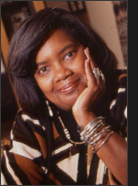 Dr. Doreen Loury Dr. Doreen Loury
Swim-In, Age 8
Click here to watch additional interview
material with Dr. Doreen Loury
Dr. Doreen Loury, currently a professor of sociology
and African-American studies at Arcadia University, experienced
the affects of segregation in the 1950s first hand in her
home town of Columbus, Ohio. As young children, Dr. Loury
and her brother entered an all white pool on a hot summer
day while the crowd chanted, "We don't want you in
our pool." Although her brother wanted
to get out, Dr. Loury encouraged him to stay because they
had a right to be there, and it was hot.
Dr. Loury also experienced racism in the South each summer when her mother took
her and her brother to visit family. Dr. Loury remembers her mother lecturing
her and her brother on the ways they would need to act differently in the South.
These experiences bring a richness to the stories and message she shares.
|
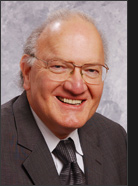 John Martin John Martin
Lawyer in Civil Rights Division of
Unites States Department of Justice
Click here to watch additional interview
material with John Martin
John Martin grew up in Birmingham, Alabama and went to college
at Birmingham-Southern College. After Mr. Martin graduated from
Harvard Law School in 1962, he joined the Civil Rights Division
of the United States Department of Justice. Mr. Martin worked
as a lawyer with the Civil Rights Division for two-and-a-half
years in the South, specifically in Mississippi, Alabama, and
Georgia. Mr. Martin worked towards enforcing the Voting Rights
Act so that everyone in the United States had the right and opportunity
to vote. In fact, Mr. Martin was the first lawyer to win a Voting
Rights Act case at the District Court level.
Mr. Martin was one of the lawyers from the Civil Rights Division
charged with ensuring the safety of James Meredith, the first
black to be enrolled at Ole Miss, and of Vivian Malone and
James Hood, the first blacks to attend the University of Alabama.
Before leaving the Civil Rights Division, Mr. Martin was involved
with the prosecution of the men who killed three civil rights
volunteers in Philadelphia, Mississippi in June 2004 - Michael
Schwerner, James Chaney, and Andrew Goodman. Mr. Martin now
practices law in Dallas, Texas at Carrington, Coleman, Sloman & Blumenthal,
L.L.P., where he has been since 1965.
|
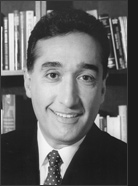 Henry Cisneros Henry Cisneros
Former Secretary of Housing & Urban Development
Click here to watch additional interview
material with Henry Cisneros
Henry Cisneros was nominated by President Clinton to serve as
Secretary of Housing and Urban Development in 1992. A former
President of Univision (the nation's fifth-largest TV network),
Cisneros now serves as Chairman of American CityVista, where
he is leading a movement to assist with low-income housing needs
in urban areas.
As a member of President Clinton's Cabinet, Secretary Cisneros
was responsible for federal housing and economic development.
He administered fair housing activities as well as federally
assisted housing and economic development programs throughout
the nation. Before his service to the United States, Cisneros
became the first Hispanic mayor of a major U.S. city when he
was elected Mayor of San Antonio, the nation's 10th largest
city, in 1981.
Cisneros graduated from Texas A&M with a B.A. and M.A.
in urban and regional planning. He earned an MA in Public Administration
from the John F. Kennedy School of Government at Harvard and
a Ph.D. in Public Administration from George Washington University.
Henry Cisneros has received numerous awards and honors. In
1982, he was selected as one of the "Ten Outstanding Young
Men of America" by the U.S. Jaycees. Four years later,
City and State Magazine named him Outstanding Mayor, and in
1991, VISTA Magazine awarded him with its Hispanic Man of the
Year honor.
|
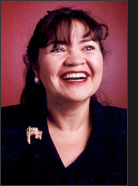 Professor Norma Cantú Professor Norma Cantú
Former Assistant Secretary of Education for Civil
Rights
Click here to watch additional interview
material with Professor Norma Cantú
Norma Cantú is a professor of law at the University
of Texas School of Law. She previously served for eight years
as the Assistant Secretary of Education for Civil Rights in
the Clinton Administration, where she oversaw a staff of approximately
850 in implementing governmental policy for civil rights in
American education. Within the first two years, her office
increased the number of illegal discrimination complaints resolved
by 20%; more than a third of the cases were disposed of without
adversarial proceedings based on voluntary corrective action.
By her final year in office, the number of cases resolved each
year had risen almost another 20%.
Prior to her service as the nation's chief civil rights enforcer
in the educational arena, Professor Cantú worked for
fourteen years as regional counsel and education director of
the Mexican-American Legal Defense and Educational Fund. In
that capacity, she litigated scores of important cases affecting
educational funding, disability rights, student disciplinary
policies, access to special services for English-language learners,
and racially hostile environments.
Professor Cantú is a Harvard Law School graduate. She
graduated summa cum laude from the University of Texas-Pan
American at the age of 19, taught high school English, and
then enrolled at Harvard Law School, where she graduated at
the age of 22.
|
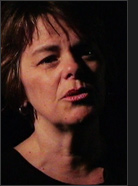 Mary Beth Tinker Mary Beth Tinker
Protested Viet Nam War, Age 13
Click here to watch additional interview
material with Mary Beth Tinker
Mary Beth Tinker grew up in Iowa, where her father was a Methodist
minister. Her parents believed that religious ideals should be
put into action and the whole family became involved in the civil
rights movement in the 1960s. One of Mary Beth's early memories
is of her parents going to Ruhlville, Mississippi in 1964 as
part of a group of ministers helping to bring attention to the
work of the Southern Christian Leadership Conference and Fannie
Lou Hamer.
When Mary Beth Tinker was a student in Des Moines, Iowa, the
school board tried to block the students from wearing the armbands,
and most of the students who wore them were suspended. Tinker,
along with other students, challenged the school board's actions
in court. The case eventually went to the Supreme Court, where
a landmark decision in favor of the students was made in 1969.
The court ruled that students in public schools do have First
Amendment rights. Justice Abe Fortas wrote in the majority
opinion that students and teachers do not "shed their
constitutional rights...at the schoolhouse gate."
Mary Beth Tinker moved to St. Louis in 1968 and graduated
from University City High School in 1970. She works as a nurse
practitioner and has remained involved in advocating for youth,
particularly in the areas of education and health. |
 |
|


